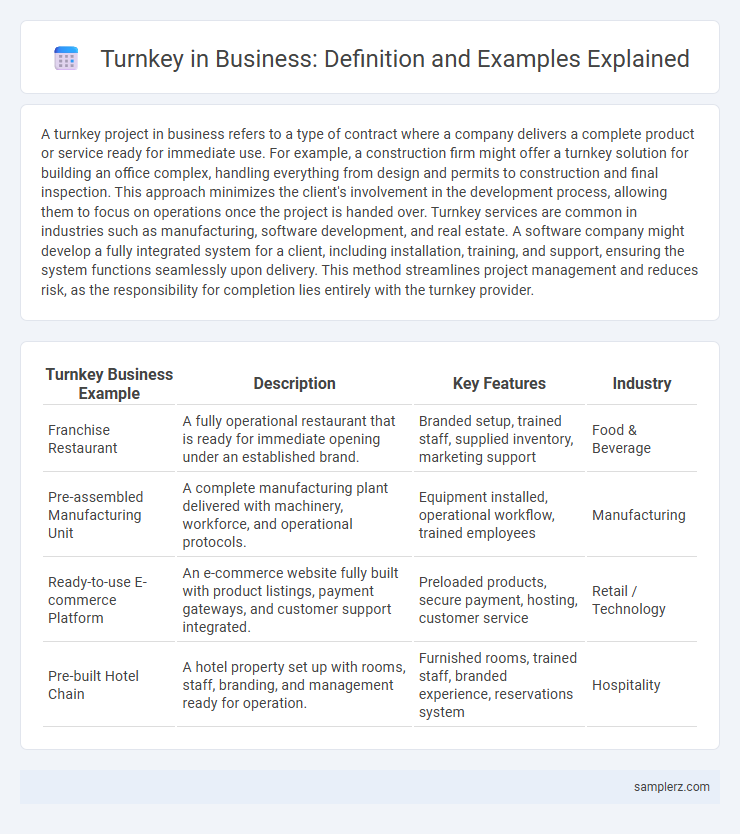A turnkey project in business refers to a type of contract where a company delivers a complete product or service ready for immediate use. For example, a construction firm might offer a turnkey solution for building an office complex, handling everything from design and permits to construction and final inspection. This approach minimizes the client's involvement in the development process, allowing them to focus on operations once the project is handed over. Turnkey services are common in industries such as manufacturing, software development, and real estate. A software company might develop a fully integrated system for a client, including installation, training, and support, ensuring the system functions seamlessly upon delivery. This method streamlines project management and reduces risk, as the responsibility for completion lies entirely with the turnkey provider.
Table of Comparison
| Turnkey Business Example | Description | Key Features | Industry |
|---|---|---|---|
| Franchise Restaurant | A fully operational restaurant that is ready for immediate opening under an established brand. | Branded setup, trained staff, supplied inventory, marketing support | Food & Beverage |
| Pre-assembled Manufacturing Unit | A complete manufacturing plant delivered with machinery, workforce, and operational protocols. | Equipment installed, operational workflow, trained employees | Manufacturing |
| Ready-to-use E-commerce Platform | An e-commerce website fully built with product listings, payment gateways, and customer support integrated. | Preloaded products, secure payment, hosting, customer service | Retail / Technology |
| Pre-built Hotel Chain | A hotel property set up with rooms, staff, branding, and management ready for operation. | Furnished rooms, trained staff, branded experience, reservations system | Hospitality |
Understanding Turnkey Solutions in Business
Turnkey solutions in business refer to fully completed projects delivered ready for immediate use, such as a pre-designed e-commerce platform or a fully equipped manufacturing facility. These solutions streamline implementation by providing all necessary components, including hardware, software, and services, eliminating the need for clients to manage multiple vendors. Companies like Siemens and IBM offer turnkey systems to enhance operational efficiency and reduce time-to-market in various industries.
Key Features of a Turnkey Business Model
A turnkey business model offers a fully operational enterprise ready for immediate use, featuring streamlined setup processes, comprehensive training, and standardized operating procedures. It ensures minimal risk and faster return on investment by providing established brand recognition, supply chain logistics, and customer acquisition strategies. Key features include scalable systems, integrated technology platforms, and ongoing support from the parent company.
Turnkey Franchise Examples Across Industries
Turnkey franchises like McDonald's in the fast-food industry, Anytime Fitness in fitness centers, and Servpro in disaster restoration provide fully equipped business models ready for immediate operation, reducing startup risks for entrepreneurs. These franchise opportunities include pre-established branding, training programs, and operational support, enabling franchisees to quickly enter the market with proven systems. The turnkey model is especially popular in industries requiring standardized processes and strong brand consistency, facilitating rapid expansion and scalability.
Turnkey Manufacturing Solutions for Startups
Turnkey manufacturing solutions for startups offer comprehensive production services including design, prototyping, assembly, and quality control, allowing new businesses to launch products quickly without managing each stage independently. Companies like Foxconn provide turnkey manufacturing that handles complex electronics assembly at scale, reducing startup costs and accelerating time-to-market. Utilizing turnkey solutions enables startups to focus on innovation and marketing while relying on experienced manufacturers for efficient, end-to-end production.
Advantages of Adopting Turnkey IT Systems
Turnkey IT systems offer businesses seamless integration by providing pre-configured hardware, software, and services that reduce deployment time and minimize operational disruptions. These all-in-one solutions enhance scalability and ensure consistent performance with vendor-backed support, resulting in lower total cost of ownership. Companies benefit from simplified project management and faster return on investment by adopting turnkey IT systems tailored to their specific industry needs.
Real Estate Turnkey Business Case Studies
Real estate turnkey business case studies highlight projects where developers deliver fully renovated, tenant-ready properties to investors, minimizing time and operational risks. Notable examples include Roofstock's turnkey single-family rental properties, providing instant cash flow streams through pre-leased homes. These cases demonstrate streamlined investment processes, combining property acquisition, renovation, and property management into a single comprehensive service.
Turnkey Service Providers: Selection Criteria
Selecting turnkey service providers in business requires evaluating industry experience, project scope expertise, and compliance with regulatory standards to ensure seamless project execution. Assessing financial stability, client testimonials, and quality certifications helps determine the provider's reliability and capability to deliver end-to-end solutions. Prioritizing providers with robust project management skills and proven track records minimizes risks and optimizes resource allocation for successful turnkey project completion.
Cost Analysis of Turnkey Project Implementation
Turnkey project implementation in business often includes comprehensive cost analysis covering initial capital investment, operational expenses, and risk mitigation strategies. Detailed budgeting for design, procurement, construction, and commissioning phases ensures accurate financial forecasting. Evaluating potential cost overruns and contingency allocations helps optimize resource allocation and maximize return on investment.
Turnkey Construction Projects: Business Impact
Turnkey construction projects streamline business operations by delivering fully completed facilities ready for immediate use, minimizing startup time and costs. These projects enhance efficiency and reduce risk by transferring design, construction, and project management responsibilities to a single contractor. Companies benefit from predictable budgeting and accelerated timelines, enabling faster market entry and improved return on investment.
Future Trends in Turnkey Business Solutions
Future trends in turnkey business solutions emphasize integration of AI-driven automation, enhancing efficiency and reducing operational costs for companies adopting these models. Cloud-based turnkey platforms enable real-time data analytics and remote management, supporting agile decision-making in sectors like manufacturing and retail. Sustainable turnkey projects are rising, with businesses prioritizing eco-friendly technologies and circular economy principles to meet regulatory standards and consumer demand.

example of turnkey in business Infographic
 samplerz.com
samplerz.com